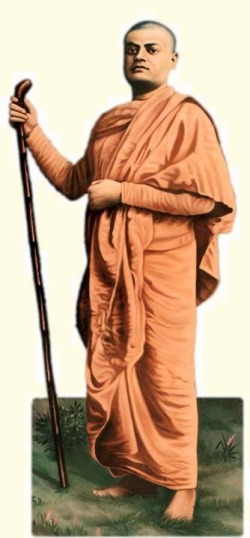College and Bramho Samaj

Narendranath entered the first year Arts class of Presidency College, Calcutta in January 1880 and the next year he shifted to Scottish Church College, Calcutta. During the course, he studied western logic, western philosophy and history of European nations. In 1881 he passed the Fine Arts examination and in 1884 he passed the Bachelor of Arts.
According to his professors, student Narendranath was a prodigy. Dr. William Hastie, the principal of Scottish Church College, where he studied during 1881-84, wrote, "Narendra is really a genius. I have travelled far and wide but I have never come across a lad of his talents and possibilities, even in German universities, among philosophical students." He was regarded as a srutidhara—a man with prodigious memory. After a discussion with Narendranath, Dr. Mahendralal Sarkar reportedly said, "I could never have thought that such a young boy had read so much!"
From his childhood, he showed inclination towards spirituality, God realisation and realizing the highest spiritual truths. He studied different religious and philosophical systems of East and the West; he met different religious leaders. He came under the influence of the Brahmo Samaj, an important socio-religious organization of that time. His initial beliefs were shaped by Brahmo Samaj, which believed in formless God, deprecated the worship of idols and devoted itself to socio-religious reforms. He met the leaders of Brahmo Samaj—Devendranath Tagoreand Keshub Chandra Sen, questioning them about the existence of God, but he could not get convincing answers.
Narendranath is said to have studied the writings of David Hume, Immanuel Kant, Johann Gottlieb Fichte, Baruch Spinoza, Georg W. F. Hegel,Arthur Schopenhauer, Auguste Comte, Herbert Spencer, John Stuart Mill, and Charles Darwin. Narendra became fascinated with the Evolutionism of Herbert Spencer, and translated Spencer’s book on Education into Bengali for Gurudas Chattopadhyaya, his publisher. Narendra also had correspondence with Herbert Spencer for some time. Alongside his study of Western philosophers, he was thoroughly acquainted with Indian Sanskrit scriptures and many Bengali works.
His first introduction to Ramakrishna occurred in a literature class, when he heard Principal Hastie lecturing on William Wordsworth's poem The Excursion and the poet's nature-mysticism. In the course of explaining the word trance in the poem, Hastie told his students that if they wanted to know the real meaning of it, they should go to Ramakrishna of Dakshineswar. This prompted some of his students, including Narendranath to visit Ramakrishna.
